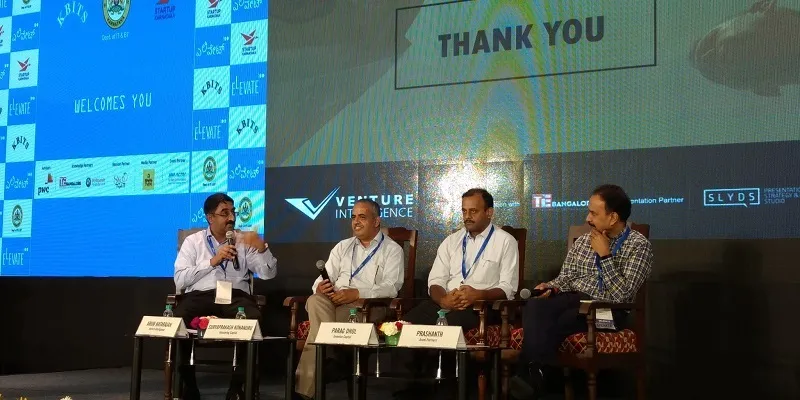Investors are looking for asset light businesses
A startup could be set in the hyperlocal, agri-lending or IoT space, but the fundamental economies of the business model should make sense to attract VC interest.
Conversations around investments and investors never stop.
YourStory data shows that the first half of 2017 saw a total of 455 deals valued at $7.02 billion, as compared to $3.5 billion in 2015 and $2.1 billion in 2016. A large part of this can be attributed to Flipkart’s $1.4 billon round from eBay, Microsoft and Tencent Holdings and Paytm’s $1.4 billion round from Japanese conglomerate SoftBank Group Corp.
But what does it say about the investment strategy of Indian investors?
Suryaprakash Konanuru, Chief Technology Officer of Ideaspring Capital; Parag Dhol, Managing Director, Inventus (India) Advisors; Prashanth Prakash , Partner at Accel Partners; and Arun Natarajan, Founder at Venture Intelligence; came together on Wednesday to discuss this at Elevate 100, an initiative by the Karnataka government. The programme, by Department of Information Technology and Biotechnology, aims to provide a comprehensive entrepreneurship platform for startups.

It’s no secret that 2015 saw an outpouring of investments in Indian startups, with investors pumping in $9 billion across 1,005-plus deals. This figure fell drastically to $4 billion in 2016 across 1,040 angel and VC/PE deals.
The profitability and growth tightrope
Speaking about this up-and-down run of the VC asset class, Prashanth stated, “It can be integral to the VC cycle. To be honest, a lot of disruption happens in these cycles. The amount of capital needed to push these huge platforms can also lead to disproportionate returns. And currently, there is a lull globally. So ups and downs are a part of the model.”
In 2015, venture capitalists placed bets on similar models from the food technology sector along with hyperlocal and e-commerce ventures.
On venture capitalists funding me-too models, Parag said,
“VC investing is a tightrope between profitability and growth with little freedom. A lot of freedom is taken on the growth side. In 2015, the growth bit got over-emphasised. If you hear the chatter, some will say that if a startup was growing at 15 percent month-on-month in 2015, it would get investments. At present, they say that if you’re growing at a lesser rate but with profitability, you might attract investments.”
Parag added that as a venture capitalist, the fundamental economies of a business should make sense.
He said: “If a startup is going to lose money on every package it sells, it clearly doesn’t make sense.”
The sectors of preference
Highlighting the interesting sectors for investments, Suryaprakash added, “We are looking at industrial IoT and believe that there is a lot of scope around making process frictionless in an industrial setup. We also believe personalisation as a space still has potential, apart from looking at networking and security.”
Parag agreed that Internet of Things (IoT) is an interesting area. Stating that marketplace and aggregation models are history, he said the trend is now to layer value-added services in these marketplaces.
Prashanth, of Accel, finds fintech an interesting area for investment. “We are looking at specialisations in this sector, be it trade financing, agri-lending, and more. The typical SME lending models are done.”
He said that after privatisation of banks, there hasn’t been any big innovation in fintech. “But we are bullish on fintech for another year.”
Moving on from sectors, Prashanth said,
“At present, investors are looking for asset light businesses, because profitability might be a corollary of the same.”
However, the investors on the panel concurred that Series A seemed to be lacking vitality. For Series B and C, global investors getting comfortable with the idea of investing in India were evincing interest.
Highlighting the reason for lack of interest in Series A, Prashanth stated, “Series A seems to be too early for global investors. And by nature, Series A usually demands followup investments.”
The answer? Maybe seed investors can pool in and help bridge the gap.
Corporates playing key roles?
John Kuruvilla, Chief Mentor, Brigade Real Estate Accelerator Program (REAP) has said raising money “should be the least of a startup’s problems. Building and growing your business is more like the problem”.
Over the past couple of years, technology and retail behemoths like IBM, Cisco, NetApp and Target among others have launched their accelerator programmes.
So what role can corporates play in the building of startups?
Amey Mashelkar, Head of Gennext Innovation Hub (owned by Reliance Industries), said, “We help startups in the retail segment and as a strategic vendor.”
Madhurima Agarwal of NetApp said, “We are sector-agnostic, but the companies have to be working with technology. We are into storage, data management and hybrid cloud.”
NetApp sees two channels for engaging startups. The first is building solutions with NetApp in mind, for which the startup is helped and mentored by the company. The second is building for NetApp’s customers, for which senior sales team members are assigned.
Alok Kumar, Managing Director, Swiss Re, said, “Our accelerator programme partners and taps other accelerators, building collaborations that can be essential for solving problems and can foster innovation.”
On startup mentorship, John said Brigade REAP provides guidance, proof of concept and makes businesses ready for collaboration or even acquisition by the Brigade group.
But while corporates can help find the right customers or the perfect proof of concept, Sanjay Anandaram, Governing Board Member, smartly summarised the conundrum of starting up. He said,
“Every entrepreneur thinks what they are working on is so unique that they have to build on it. But most of the time it’s not about just being unique but also better, faster, and cheaper. Don’t ever be under the misconception of uniqueness. Startups should think about how they should partner with people who can make their product better and bring it to the market faster.”
Website- Elevate100







